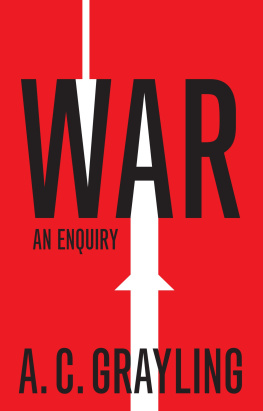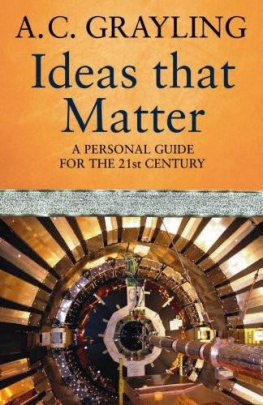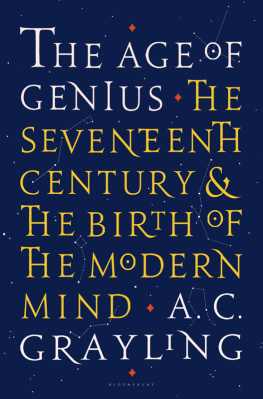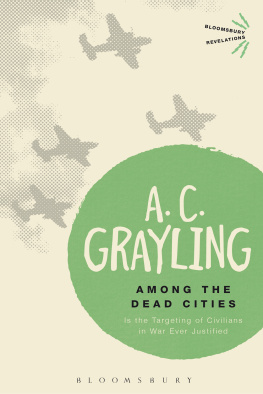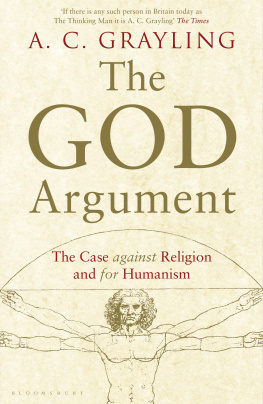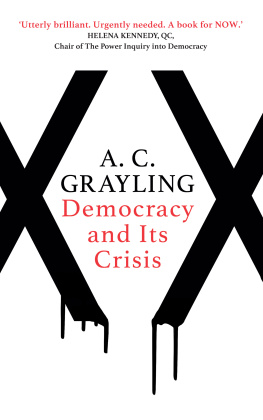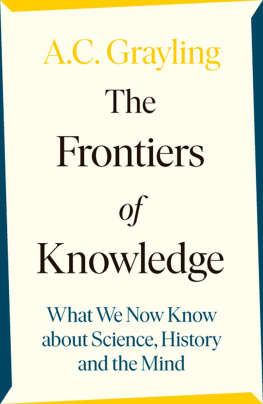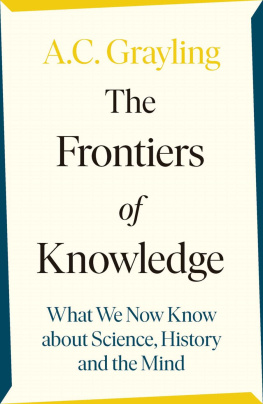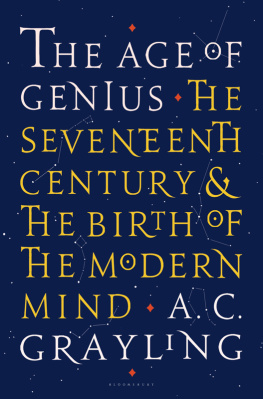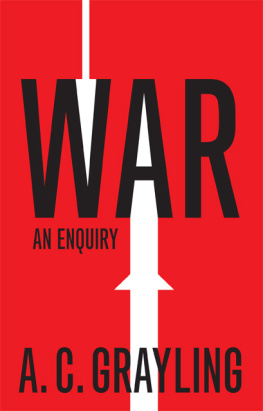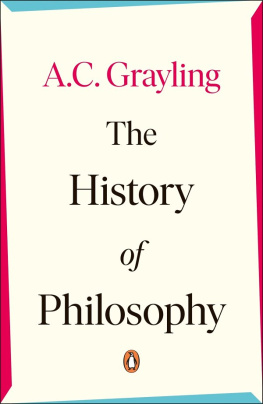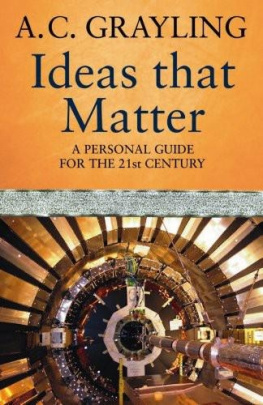WAR

VICES AND VIRTUES
Series editors Richard G. Newhauser and John Jeffries Martin
Copyright 2017 A. C. Grayling
All rights reserved. This book may not be reproduced in whole or in part, in any form (beyond that copying permitted by Sections 107 and 108 of the U.S. Copyright Law and except by reviewers for the public press) without written permission from the publishers.
For information about this and other Yale University Press publications, please contact:
U.S. Office:
Europe Office:
Set in Sabon MT by IDSUK (DataConnection) Ltd
Printed in Great Britain by TJ International Ltd, Padstow, Cornwall
Library of Congress Control Number: 2017934014
Names: Grayling, A. C., author.
Title: War : an enquiry / A.C. Grayling.
Description: New Haven, CT : Yale University, 2017. | Series: Vices and
virtues | Includes bibliographical references and index.
Identifiers: LCCN 2017000689 (print) | LCCN 2017010233 (ebook) |
ISBN 9780300175349 (alk. paper) | ISBN 9780300226287 ()
Subjects: LCSH: War (Philosophy) | WarHistory. | WarMoral and
ethical aspects.
Classification: LCC U21.2 .G674 2017 (print) | LCC U21.2 (ebook) |
DDC 355.0201dc23
LC record available at https://lccn.loc.gov/2017000689
A catalogue record for this book is available from the British Library.
10 9 8 7 6 5 4 3 2 1
War is a bloody, killing business. Youve got to spill their blood, or they will spill yours! Rip them up the belly. Shoot them in the guts. When shells are hitting all around you and you wipe the dirt off your face and realize that instead of dirt its the blood and guts of what was once your best friend beside you, youll know what to do.
From General George Pattons speech to the United States Third Army, 1944
One cannot fight a war with one hand tied behind ones back.
Winston Churchill
War does not determine who is right, only who is left.
Attributed to Bertrand Russell
Mankind must put an end to war or war will put an end to mankind.
John F. Kennedy, address before the United Nations, 1961
I hate war as only a soldier who has lived it can, only as one who has seen its brutality, its futility, its stupidity.
Dwight D. Eisenhower, address before the Canadian Club, 1946
You may not be interested in war, but war is interested in you.
Attributed to Leon Trotsky
Contents
Foreword
Richard G. Newhauser and
John Jeffries Martin
War has been a salient aspect of human civilisation for the last 5,000, if not the last 10,000 years. We should not normalise this. Even if war may have at times accomplished some good in the past, it has routinely been and remains the source of great harm and suffering. The combined death toll of the First and Second World Wars, for example, exceeded 100 million souls. But the terms of the debate have shifted. In the nuclear age war has the potential to destroy civilisation itself.
Through most of recorded history, ethicists have sought to limit both the frequency and the lethality of war. Yet, as A. C. Grayling demonstrates in this analysis of armed conflict between states or nations, or between identified and organised groups of significant size and character, moral reasoning about war has never been static but has rather continually sought to adapt to new social and political circumstances as well as to new technologies. Moral reasoning, that is, can best be understood historically.
Indeed, the central goal of the series Vices and Virtues, to which Grayling has now contributed the first two volumes, is to underscore the deep connections between historical change and ethics. This is true of a wide spectrum of moral subjects, from friendship and war to emotions such as anger. Moral concepts, this series argues, have neither fixed contents nor contours. On the contrary, their meanings shift as new historical circumstances and challenges arise; they are cultural constructions. The series does not seek to offer one model of how ethical thought is related to social, political and cultural change. Its goal rather is to open up a sense of the diverse ways in which moral reasoning is shaped by and shapes the worlds in which we live. War may be a reality, but this in no way diminishes the need to imagine a warless world indeed, the two may go hand-in-hand.
The exploration of changes in moral thought, moreover, is not limited to the past. As Grayling makes clear, our ethical reasoning about war must continue to adapt to emerging forms of physical warfare. As the battlefield becomes increasingly automated, for example, how should we fashion a morality that guides us in the regulation of computerised weapons capable of making increasingly complex decisions about when to strike and whom to kill? Yet it is above all the nuclear threat that requires a redoubling of our moral imaginations. The mere existence of such weapons poses an existential threat to humanity. If our species is to survive, we must bring an end to war.
Perhaps Graylings most compelling and hopeful innovation has been his decision to juxtapose war not to peace, its customary opposite, but rather to friendship, the subject of his earlier book inaugurating the series. If war undermines the bonds between us, forcing each of us into a corner and leading us to seek the destruction of our enemies, friendship fosters these bonds, leading us to hope for the best for our fellow beings. To be sure, friendship is a category that, in general, we use for a few and not for whole societies. Yet Grayling does suggest in this book that our best hope to avoid war lies in our recognition that we are far less likely to fall prey to war if we can promote greater integration among peoples, along with mutual linkages of a practical and beneficial kind, and the elimination of boundaries between interests. In short, the elimination of war would seem to require a kind of global friendship. The question remains open whether or not we human beings have the will to achieve this.
Preface
This book makes a pair with a previous book published by Yale University Press: Friendship (2013). In that book I discuss aspects of the most desirable of human relationships and, arguably, the most achieved of such, in the sense that it is where our best interpersonal bonds are to be found, as the mature form of the many different kinds of loves, family ties and comradeships there are. Discussion of friendship as an ideal was initiated by the philosophers of classical antiquity, beginning with Plato and then most famously Aristotle, who devoted two books of his Nichomachean Ethics to the subject, thus sparking a debate about friendship which persists to our own day and has had many distinguished contributors.
Friendships opposite is enmity, and the fullest expression of organised enmity takes the form of war. At the very outset of looking at the phenomenon of war I must declare an interest: while being the closest thing to a pacifist that one can be without being a pacifist, and while abominating war, I think there are two sets of circumstances in which fighting a war is justified and can even be a duty. They are explained in the appropriate place below. But I emphatically think as by far the great majority of us must that war is an evil, a great evil, even in the two cases which I think justified; they too are an evil, though alas necessary ones.
As an evil, even in the rare cases in which it is justified, war raises urgent ethical questions, not least about what conduct is acceptable during hostilities. In Among the Dead Cities (2006) I examined the particular case of Allied mass bombing attacks on the civilian populations of Germany and Japan during the Second World War. My argument was that the Allied war against Nazism and Japanese aggression was justified indeed, the Allies had a moral duty to defeat these evils since they were greater evils than the evil of a war to oppose them but that this fact did not justify all the actions taken in pursuit of that aim. And this applied paradigmatically to indiscriminate aerial bombardment which means attempted and enacted massacre of civilian populations. This is an example of the difficult question that moral considerations prompt when one reflects on Winston Churchills remark that One cannot fight a war with one hand tied behind ones back. Moral scruples can dangerously hamper military efforts; in the darkest days of the Second World War, when Britain was alone in facing Nazi Germany, and the Wehrmacht was massing on the French coast in preparation for an invasion, it would have seemed suicidal to wring hands over which harms to the foe were acceptable and which not. And yet it is precisely in times of greatest emergency that such questions are most in need of clear and, one hopes, principled answers.
Next page
